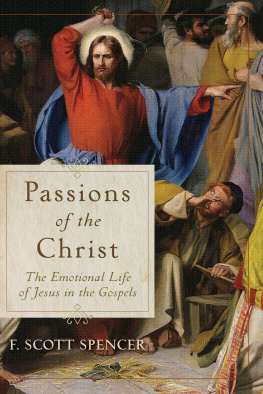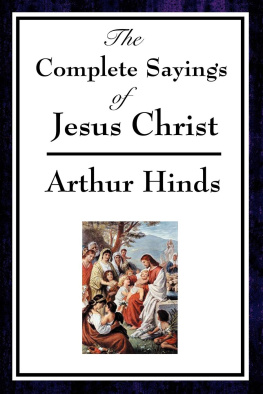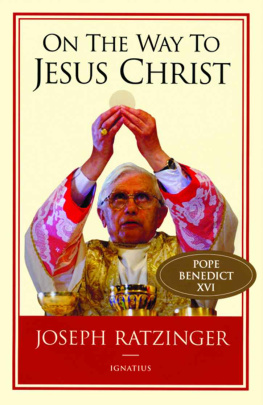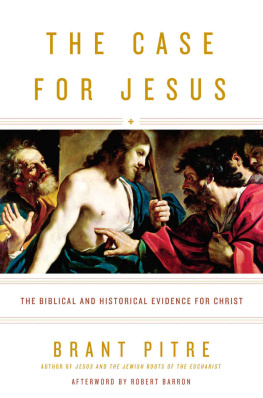Only a scholar who has spent decades on the topic could deliver the excellent and nuanced study that Spencer provides here. His wide-ranging discussion of emotions as understood from both ancient philosophical and contemporary psychological and neurological studies illumines the reports of Jesuss emotions in the Gospelsthose usually seen as negative as well as those we view as positive. But even beyond this, Spencer demonstrates how studies of emotions can help us overcome the limitations imposed by Enlightenment-bound understandings of the nature of God, of the incarnation, and of our own human nature. This is a welcome introduction to those not familiar with the study of emotion in biblical texts, and it is an advance of the discussion for scholars in the field.
Jerry L. Sumney , Lexington Theological Seminary
In Passions of the Christ , Spencer has done an extremely impressive job of combining erudite New Testament exegesis with his vast knowledge of ancient and contemporary philosophy, theology, and psychological research on emotions. By highlighting the value of giving proper attention to the emotions of Jesus as they are described in the Gospels, Spencer not only enriches his readers understanding of the passionate Christ but also illuminates often overlooked emphases in each pericope discussed. In short, this book is a highly valuable interdisciplinary approach to the study of the Gospels portrayals of Jesus.
Copyright Page
2021 by F. Scott Spencer
Published by Baker Academic
a division of Baker Publishing Group
PO Box 6287, Grand Rapids, MI 49516-6287
www.bakeracademic.com
Ebook edition created 2021
All rights reserved. No part of this publication may be reproduced, stored in a retrieval system, or transmitted in any form or by any meansfor example, electronic, photocopy, recordingwithout the prior written permission of the publisher. The only exception is brief quotations in printed reviews.
Library of Congress Cataloging-in-Publication Data is on file at the Library of Congress, Washington, DC.
ISBN 978-1-4934-2948-6
Unless otherwise indicated, Scripture quotations are from the New Revised Standard Version of the Bible, copyright 1989 National Council of the Churches of Christ in the United States of America. Used by permission. All rights reserved.
Scripture quotations labeled CEB are from the Common English Bible. Copyright 2011 by the Common English Bible. All rights reserved. Used by permission.
Scripture quotations labeled KJV are from the King James Version of the Bible.
Scripture quotations labeled NAB are from the New American Bible with Revised New Testament and Revised Psalms 1991, 1986, 1970 Confraternity of Christian Doctrine, Washington, DC, and are used by permission of the copyright owner. All rights reserved.
Scripture quotations labeled NASB are from the New American Standard Bible (NASB), copyright 1960, 1962, 1963, 1968, 1971, 1972, 1973, 1975, 1977, 1995 by The Lockman Foundation. Used by permission. www.Lockman.org
Scripture quotations labeled NETS are from A New English Translation of the Septuagint , 2007 by the International Organization for Septuagint and Cognate Studies, Inc. Used by permission of Oxford University Press. All rights reserved.
Scripture quotations labeled NIV are from THE HOLY BIBLE, NEW INTERNATIONAL VERSION, NIV Copyright 1973, 1978, 1984, 2011 by Biblica, Inc. Used by permission. All rights reserved worldwide.
Scripture quotations labeled NJPS are from the New Jewish Publication Society Version 1985 by The Jewish Publication Society. All rights reserved.
Scripture quotations labeled RSV are from the Revised Standard Version of the Bible, copyright 1946, 1952 [2nd edition, 1971] National Council of the Churches of Christ in the United States of America. Used by permission. All rights reserved worldwide.
Dedication
To Lauren and Mark, Meredith and Jimmy
(and Oscar, Lucinda, and Seamus)
Contents
Cover
Endorsements
Title Page
Copyright Page
Dedication
Preface
Abbreviations
PART 1 MISSION IM/PASSIBLE: THEORY AND THEOLOGY
1. Emotion Theory and the Passional Christ
2. The Pathos Logic of Theology and Christology
PART 2 THE VIRTUE OF JESUSS VEHEMENT EMOTIONS
3. Thats Enough! The Angry Jesus
4. Thats Heart Rending! The Anguished Jesus in Ministry
5. Thats Soul Crushing! The Anguished Jesus at the End
6. Thats Gross! The Disgusted Jesus
PART 3 THE POWER OF JESUSS POSITIVE EMOTIONS
7. Thats Amazing! The Surprised Jesus
8. Whats Love Got to Do with It? The Compassionate Jesus an d Pastoral Ministry
9. Whats Love Got to Do with It? The Compassionate Jesus and Discipleship
10. Thats Good! The Joyous Jesus
Epilogue: Final Thoughts about Jesuss Emotions
Bibliography
Author Index
Scripture and Ancient Writings Index
Back Cover
Preface
A bout a dozen years ago I began to notice how hot the study of emotions had become across a wide array of disciplines in both the humanities and the sciences. As the historian Jan Plamper reflected in 2012, I write during a boom in the history of emotions; there is gold rush fever in the air. Paper and panel sessions ensued at the annual SBL meetings, along with a published collection of seventeen essays by an international team of scholars, which I edited for SBL Press under the title Mixed Feelings and Vexed Passions: Exploring Emotions in Biblical Literature (2017).
The present volume represents the fruit of my particular interest in the emotional life of Jesus portrayed in the canonical Gospels, interweaving close textual analysis of relevant Gospel texts with ancient and modern theological, philosophical, and psychological approaches to emotion study. It offers, I believe, the most thorough exegetical-cum-interdisciplinary investigation of the subject to date.
A handful of other recent studies of Jesuss emotions (biblical scholars paid little attention to the matter until this century) have also capitalized on the broader surge of emotion research to various degrees. Matthew Elliotts
Standing most apart in the group, Roy M. Oswald and Arland Jacobsons The Emotional Intelligence of Jesus: Relational Smarts for Religious Leaders (2015) tracks Jesuss overall emotional intelligence or EQ (distinct from IQ) profilein terms of self-awareness, transparency, empathy, inspiration, assertiveness, optimism, and stress resilience, among other traitsas a model for modern pastors and congregations. Although sketching a winsome picture of Jesuss emotional demeanor in the Gospels (Jacobson is a trained New Testament scholar as well as a pastor), it does so in broad strokes; cursory examination of Gospel texts offers a thin springboard for diving into extended applications to contemporary religious leadership.
I appreciate the contributions these monographs and their authors (and others I might have overlooked) have made to kick-starting interest in Jesuss emotional life in the Gospel narratives in dialogue with cross-disciplinary emotion research. Again, however, I hope that this book significantly moves the discussion down the field, covering more textual and theoretical ground in a compelling way.
A quick glance at the table of contents will disclose roughly equivalent concentrations on Jesuss negative/vehement (anger, anguish, disgust) and positive/virtuous (surprise, love, joy) emotions, resisting simplistic assessments of Jesuss high EQ. Humans are emotionally complex beings, intertwining a welter of dynamic feelings for good and ill and everything in between. All feelings are mixed to some degree betwixt and between intricate neural circuits, social networks, and environmental ecosystems. Although the Gospels provide nothing close to a full psychological profile of Jesus, they do provocatively illustrate some rich facets of his emotional life, the Word made feeling together with flesh.











